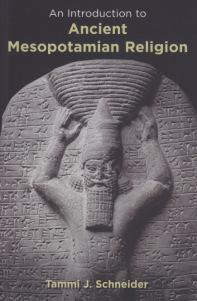 As a refresher on my own ancient history, I picked up Tammi J. Schneider’s An Introduction to Ancient Mesopotamian Religion.This was one of those books that spawned several internal conversations simultaneously as I realized just how much modern lenses color our perceptions of past societies.Before commenting on that, however, a few necessary points must be made.Our knowledge of Mesopotamia is in its infancy.There are only a handful of universities around the world that have the resources to prepare young Assyriologists adequately Once prepared, those young folk will be introduced to the job market of those with far lesser education because there are practically no jobs in the field.Seems a poor way to treat the civilization that invented wheels, arches, and beer.Or so I’ve read.In any case, many tablets in ancient languages have never been translated because there simply aren’t enough people to do it.Any conclusions, therefore, must remain tentative.
As a refresher on my own ancient history, I picked up Tammi J. Schneider’s An Introduction to Ancient Mesopotamian Religion.This was one of those books that spawned several internal conversations simultaneously as I realized just how much modern lenses color our perceptions of past societies.Before commenting on that, however, a few necessary points must be made.Our knowledge of Mesopotamia is in its infancy.There are only a handful of universities around the world that have the resources to prepare young Assyriologists adequately Once prepared, those young folk will be introduced to the job market of those with far lesser education because there are practically no jobs in the field.Seems a poor way to treat the civilization that invented wheels, arches, and beer.Or so I’ve read.In any case, many tablets in ancient languages have never been translated because there simply aren’t enough people to do it.Any conclusions, therefore, must remain tentative.
Ancient religion in western Asia was extremely political.From our perspective, this seems odd—although it’s happening again in real time.Ancient societies relied on the cooperation of religious and political leaders and each institution helped the other.They didn’t have the added complication of monotheism to deal with.In trying to keep all the gods happy, they simply reasoned that if things fell apart, another god had grown to a superior position.Certainly they believed the gods were there—we do too.We call them cash, the stock exchange, and commodities, but we still worship and adore.And they keep the government going.(I kind of liked it better when they were old-fashioned gods; at least they had sympathy for the human condition.)
After getting to know the gods, Mesopotamians recognized that humans were to do the work for them.Gods, after all, owned the land and priests and kings were powerful individuals.You didn’t want to cross them.Rituals were developed to ensure the smooth continuation of seasons and agriculture.As Schneider points out, we don’t have enough information to understand all of this.Our information comes from across millennia and from locations sometimes hundreds of miles apart.If this is a puzzle well over half the pieces are missing.We glimpse people like us, trying to survive.Gods are unpredictable, but you can try to read a liver or two to find out what’s on their minds.And some of the kings thought they were gods.The more things change, the more, it seems, they stay the same.
